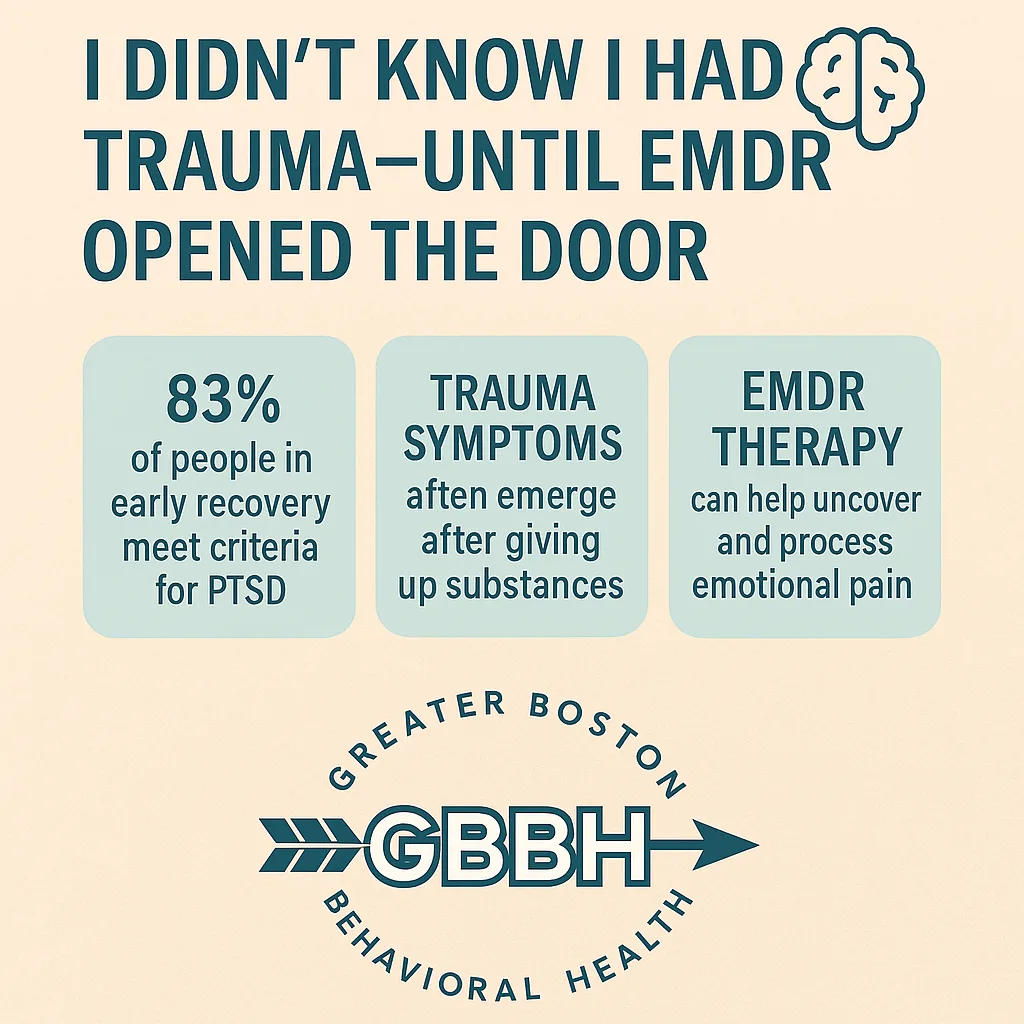When you’re newly sober, there’s a quiet expectation that things will feel better—lighter, easier, calmer. But often, it’s the opposite. The noise of drinking or using goes away… and the silence feels deafening. Many people in early recovery are surprised to discover emotions they never noticed before: anxiety, dread, emptiness, or unexplained sadness.
This is where EMDR therapy comes in. As clinicians, we’ve seen how EMDR can gently uncover the hidden layers beneath early recovery struggles, revealing past wounds that were quietly driving the chaos. You don’t have to stay stuck in that lonely, raw place—EMDR can help you feel like yourself again.
What Is EMDR Therapy—and How Does It Help with Trauma?
EMDR therapy (Eye Movement Desensitization and Reprocessing) is a therapeutic approach that helps people heal from past trauma, negative experiences, and emotional distress. It doesn’t require years of talking about your past. Instead, it uses guided eye movements (or other bilateral stimulation like tapping) to help your brain process traumatic memories in a healthier, less triggering way.
Trauma can leave memories “frozen” in your brain, causing flashbacks, intense emotions, or numbness long after the event. EMDR helps unlock these memories, allowing your brain to reprocess them so they no longer control your emotions or reactions.
At Greater Boston Behavioral Health, EMDR therapy is one of the ways we help people in early recovery address the hidden pain underneath their addiction or mental health struggles.
Why Do Trauma Symptoms Show Up After Getting Sober?
For many people, substances were unknowingly helping them numb pain from unresolved trauma. When the substances are gone, those buried feelings rise to the surface. You might suddenly feel:
- Restless and emotionally raw
- Haunted by past experiences
- Overwhelmed by small triggers
- Emotionally disconnected from yourself and others
This doesn’t mean you’re “broken.” It means your brain is no longer sedated—and now it needs a safe way to heal. EMDR therapy offers a structured and compassionate process to work through these feelings without reliving the pain in overwhelming detail.
If you’re looking for EMDR therapy in West Roxbury, MA, our licensed clinicians are here to guide you through it.
How Can EMDR Help in Early Recovery?
EMDR therapy can be a powerful tool during early recovery because it:
- Reduces emotional triggers that can lead to relapse
- Helps process past traumas that may have fueled addictive behaviors
- Lowers feelings of anxiety, shame, and guilt
- Improves self-esteem and emotional resilience
- Helps you reconnect with yourself without feeling overwhelmed
Early sobriety often feels like standing in an empty room—EMDR helps fill that space with clarity, peace, and a deeper sense of self.
Signs You Might Benefit From EMDR Therapy in Early Sobriety
It’s common to feel unsure about whether trauma is part of your story. Here are some signs EMDR therapy could be helpful:
- You experience intense emotional reactions that seem disproportionate
- You feel emotionally “stuck” or numb despite sobriety
- You have recurring nightmares or flashbacks
- You avoid certain places, people, or memories
- You struggle to connect with others or feel “normal”
- You have trouble sleeping due to restlessness or racing thoughts
If any of these resonate with you, EMDR therapy could be an important step in your healing process.
Is EMDR Therapy Safe for People in Early Sobriety?
Yes—EMDR therapy is designed to move at your pace. Many people in early recovery worry about being emotionally overwhelmed. At Greater Boston Behavioral Health, we take a gentle, supportive approach:
- We start by building safety and coping skills
- You always have control over the pace of sessions
- Processing doesn’t start until you’re ready
- Sessions are trauma-informed and deeply compassionate
For many, EMDR actually reduces early sobriety distress, making it easier to navigate emotions and stay on track.
Real Talk: Will EMDR Therapy Fix Everything?
EMDR therapy isn’t a magic wand—but it can make healing feel less like a battle. It helps you make sense of emotions that used to feel random or too intense. You might still have hard days, but they’ll feel more manageable. You’ll understand your triggers instead of being controlled by them. If you’re near Boston, Dedham, Waltham, Needham, or West Roxbury, Massachusetts, GBBH offers programs with that same approach.
Frequently Asked Questions About EMDR Therapy in Boston, MA
How long does EMDR therapy take to work?
Every person is different. Some people experience noticeable relief after a few sessions, while others may need longer-term work, especially if they have complex trauma. In early recovery, your therapist may go slower to ensure emotional stability before processing begins.
Do I have to relive all my trauma during EMDR?
No. One of the biggest benefits of EMDR therapy is that you don’t need to talk through every detail of your trauma. The process focuses on how memories feel in your body and mind—not on rehashing painful stories.
Is EMDR therapy available for people dealing with both trauma and mental health issues?
Absolutely. EMDR is used to treat trauma, anxiety, depression, and other emotional health concerns. It’s also a strong support tool for people in recovery from addiction, helping ease some of the emotional difficulties that come with sobriety.
Can EMDR help with loneliness in sobriety?
Yes, indirectly. EMDR helps clear out the emotional barriers that make connection difficult—like shame, fear of judgment, or unresolved hurt. By processing these feelings, you may find it easier to form authentic connections with others.
How do I start EMDR therapy in Boston, Massachusetts?
At Greater Boston Behavioral Health, we offer EMDR therapy with licensed clinicians trained in trauma care. Call (888) 450-3097 or visit our EMDR therapy program to schedule an initial consultation.
Gentle Healing Is Possible—You Deserve to Feel Safe
Sobriety is more than just stopping a behavior—it’s about reclaiming your peace. EMDR therapy doesn’t erase the past, but it can stop it from haunting your present. If you’ve been feeling stuck, lonely, or overwhelmed in early recovery, you don’t have to figure it out alone.
Ready to take the next step in your healing journey?
Call (888) 450-3097 or visit Greater Boston Behavioral Health’s EMDR therapy services in Boston, Massachusetts to get started with compassionate, trauma-informed care.


